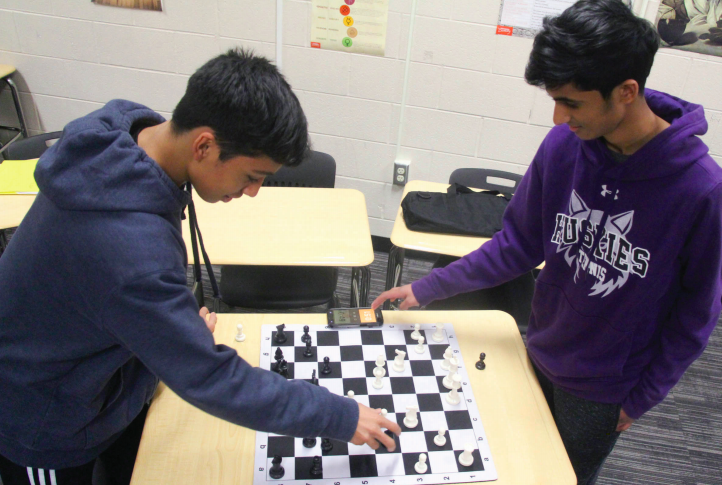Always protect your king
With the Kansas scholastic chess state competition taking place in March, two BVNW chess players detail what competitive chess is all about and why more should be interested.
Ankith Sheshappa (right) plays a game of chess with sophomore Alex Mojica (left) Jan. 15. “Chess in general has been beneficial to my mental strength,” Sheshappa said.
March 19, 2020
It can take four moves to win or lose a chess game. Four simple moves, or a game could go on for hours. This complexity is what has drawn players in and kept them playing their game. A main reason people are interested in chess is because there’s no way to beat the game, leading to infinite possibilities while playing, junior chess player Ankith Sheshappa said.
“It’s really just another board game, except the difference between it is that it really hasn’t been solved yet,” Sheshappa said. “Not even computers have solved it yet, which is the difference between it and a lot of other games. That means there’s so many possibilities and that’s why so many people like it.”
Often spending multiple hours a day practicing to accomplish his goal, Sheshappa won a state championship as an eighth grader and has won multiple local tournaments as well.
“To win state, I was putting in at least four hours of practice a day,” Sheshappa said. “It takes a lot of time and dedication to actually do well.”
A big difference between playing chess competitively and playing casually with friends or family is the amount of preparation that goes into competitive games. Situationally, the practice Sheshappa has put in has enabled him to think ahead while playing.
“Competitive players have seen so many different people, seen so many different positions and do a lot more preparation,” Sheshappa said “I have the first 10 to 20 moves memorized ready in my game based on what my opponent does, versus a casual player probably just plays move to move.”
When playing chess, one of the most important things is strategy, but junior chess player Alex Gibson said it’s important to learn the basics first.
“First, you want to learn how to move the pieces and all the basics,” Gibson said. “And then you want to start learning certain tactics that are really important because they often reoccur and allow you to attack more efficiently.”
Many chess players have found a home in the school’s Chess Club, which meets every Wednesday during Husky Halftime B. Club sponsor and Latin teacher Andrew Clark, who has played chess since he was four, said he encourages everyone to join, regardless of playing history.
“I encourage kids to play chess, if they have someone to play with here than I encourage them to join,” Clark said. “I would like to see the chess club become a place where people who don’t play chess and want to get better come and they are taught how to be better. That’s why I would encourage them to join because they can be strategic and play with their friends.”
Being less experienced than his colleague, Gibson said Sheshappa has helped to serve as a mentor for players in the club regardless of skill level.
“Ankith [has helped me the most], because he’s really good and has been a mentor for the other people and me,” Gibson said.
A big motivation for many local chess players is the ability to win money in tournaments, as players can pocket up to $400 in local tournaments and upwards of $10,000 in larger cities, such as St. Louis and Chicago. Sheshappa said he’s done well in local tournaments winning a few.
“A lot of tournaments around here you get money for how you place,” Sheshappa said. “I’d say doing well is getting top five and you’re going to get some money for that and I’ve won a couple of those.”
A common misconception about chess is that many people think you have to be smart to play. Sheshappa said this is just a myth however and that people just have to be willing to put in the work.
“I would like to invite anybody to do [chess],” Sheshappa said. “You don’t have to be smart, anyone can be good at this.”





